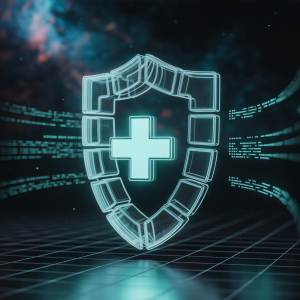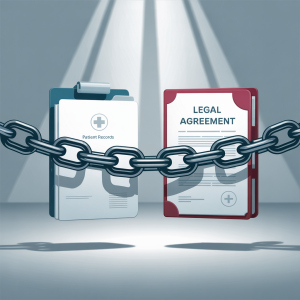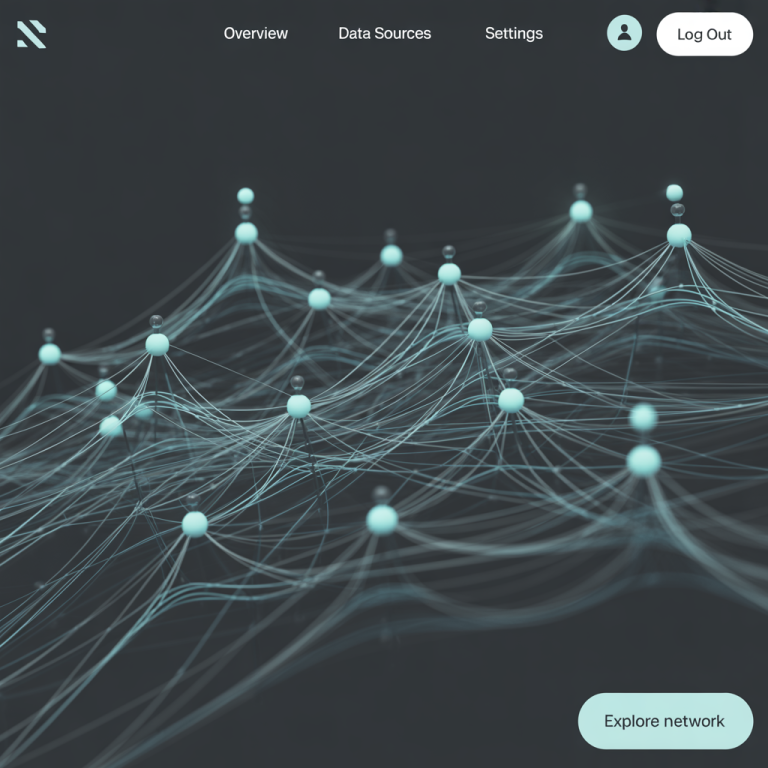Blockchain technology has been making waves in many industries, and healthcare is no exception. At its core, blockchain is a way to store data securely and transparently. This is especially important in healthcare, where sensitive medical records need protection.
When it comes to medico-legal cases, the stakes are even higher. Medical records are often key evidence. Ensuring these records are accurate, secure, and tamper-proof is crucial for fair outcomes.
This article explores how blockchain can improve the way medical records are reviewed in legal cases. We’ll look at what blockchain is, the current challenges in handling medical records, and how this technology offers real solutions.

Understanding Blockchain Technology in Healthcare
What is blockchain?
Think of blockchain as a digital ledger. It records transactions or data entries in a way that can’t be easily changed. Each piece of data is grouped into a “block.” These blocks link together, forming a chain — hence the name.
Because every block connects to the previous one, altering any data would require changing the entire chain. This makes blockchain extremely secure.
Key features: decentralization, immutability, transparency
- Decentralization: Instead of one central authority, blockchain data is stored across many computers worldwide. This reduces the risk of data being controlled or corrupted by a single entity.
- Immutability: Once information is recorded, it cannot be altered or deleted without consensus from the network. This ensures data stays trustworthy.
- Transparency: Every transaction or record on the blockchain is visible to authorized users. This transparency helps with accountability and audit trails.
Why blockchain matters for healthcare data
Healthcare data is highly sensitive. It includes personal health information, diagnoses, treatments, and more. Any breach or tampering can have serious consequences.
Blockchain offers a way to:
- Protect patient privacy
- Securely share data between doctors, lawyers, and patients
- Keep an unchangeable record of medical histories
- Improve trust in the accuracy of records during legal reviews
Challenges in Medical Record Management
Issues with traditional medical record systems
Most healthcare providers use centralized databases to store medical records. While widely adopted, these systems face several problems:
- Single point of failure: If the main server crashes or is hacked, records can be lost or altered.
- Data silos: Records are often trapped in different systems that don’t communicate well. This makes sharing information slow and difficult.
- Errors and inconsistencies: Manual data entry and system errors can lead to wrong or missing information.
Risks of data breaches and tampering
Healthcare data breaches are on the rise. Hackers target medical records because they contain valuable personal information. Once breached, data can be:
- Sold on the black market
- Manipulated to commit fraud
- Used to harm patients or influence legal cases
Tampering with medical records is a serious issue in medico-legal cases. It can unfairly sway judgments, delay justice, or harm reputations.
Challenges in medico-legal case documentation and evidence integrity
In legal cases involving medical records, proving the authenticity and integrity of records is crucial. However:
- Paper records can be lost, damaged, or forged
- Digital records without proper safeguards can be altered
- Lack of clear audit trails makes it hard to verify when and how data was accessed or changed
These challenges create uncertainty and can weaken the legal process.
How Blockchain Enhances Medical Record Reviews in Medico-Legal Cases
Blockchain technology offers practical solutions to the challenges we just discussed. It improves how medical records are handled, especially in legal settings, by adding layers of security and transparency.
Secure data storage and access control
With blockchain, medical records aren’t stored in one single place. Instead, data is encrypted and distributed across multiple computers, or “nodes.” This makes it very difficult for hackers to access or alter information.
Access control is another big advantage. Only authorized users can view or add to the records. This is controlled through cryptographic keys, kind of like special passwords that are nearly impossible to guess or steal.
Benefits of blockchain for data storage:
Feature | How It Helps |
Decentralized storage | No single failure point |
Encryption | Data stays confidential |
Permission control | Only trusted parties have access |
This means medical records stay safe, and patient privacy is protected—even in legal investigations.
Ensuring data integrity and preventing tampering
One of the biggest concerns in medico-legal cases is whether the records have been tampered with. Blockchain’s design makes this almost impossible.
Each new block of data contains a unique “hash” — a digital fingerprint — that links it to the previous block. If someone tries to change any information, the hash will no longer match. The entire blockchain network can detect this immediately.
This feature guarantees:
- Records cannot be altered after they’re added
- Any attempted tampering is instantly visible
- The history of the data remains transparent and trustworthy
Transparent audit trails for legal scrutiny
In legal cases, knowing who accessed or modified records and when is critical.
Blockchain automatically creates a detailed, time-stamped log of every transaction or change. These logs are permanent and visible to authorized parties.
This transparent audit trail means:
- Lawyers and judges can verify record authenticity quickly
- Disputes over data handling can be resolved with clear evidence
- Confidence in medical evidence is much higher

Applications of Blockchain in Medico-Legal Cases
Blockchain’s advantages translate into several useful applications in real-world medico-legal scenarios.
Verifying authenticity of medical records
Using blockchain, the authenticity of any medical record can be verified instantly. Because records are immutable and linked in the blockchain, lawyers don’t have to worry about forgeries or altered files.
Healthcare providers can share a blockchain-verified record that assures everyone involved that the data is genuine.
Real-time sharing of medical data among stakeholders
Often, medico-legal cases involve many parties—doctors, lawyers, insurers, and patients. Blockchain enables secure, real-time data sharing without compromising privacy.
Everyone gets access only to what they need, when they need it. This speeds up case reviews and reduces delays caused by paperwork or conflicting data sources.
Simplifying evidence collection and chain of custody
Proving the chain of custody is crucial in legal cases. Blockchain automates this by recording every step of data handling.
- Who created the record?
- When was it accessed?
- Was any data copied or transferred?
All this information is recorded on the blockchain, eliminating uncertainty and disputes over evidence handling.
Benefits of Blockchain for Medico-Legal Professionals
Blockchain technology is more than just a buzzword—it brings real, tangible benefits for those working in medico-legal fields. Whether you’re a lawyer, medical expert, or compliance officer, blockchain can make your work smoother and more reliable.
Increased trust and accountability
Trust is the foundation of any legal case, especially when medical evidence is involved. Blockchain’s transparency and immutability foster a high level of confidence in the records being reviewed.
Because all changes are logged and verified by multiple parties:
- No one can secretly alter records
- Everyone knows exactly who accessed the data and when
- Accountability is built into the system
This creates a clear, trustworthy chain of evidence that lawyers and judges can rely on.
Faster dispute resolution with verified records
Legal disputes often drag on because parties question the authenticity of medical records. Blockchain cuts through this uncertainty.
When records are blockchain-verified:
- Disputes over data integrity are minimized
- Cases move more quickly, saving time and legal costs
- Decisions can be based on solid, verified facts
Imagine the relief for all involved when the authenticity of evidence is clear from the start.
Reduced administrative overhead and errors
Handling medical records manually or through fragmented systems leads to errors, lost documents, and wasted time. Blockchain’s automated, tamper-proof process streamlines record-keeping.
Benefits include:
Benefit | Explanation |
Automated verification | Reduces need for manual cross-checking |
Secure sharing | Eliminates delays in transferring records |
Error reduction | Prevents data duplication or inconsistent entries |
This means less paperwork and fewer headaches for medico-legal teams.
Limitations and Considerations
While blockchain offers exciting advantages, it’s not a perfect fix. Here are some important challenges and considerations to keep in mind.
Technical and implementation challenges
Setting up blockchain systems requires significant technical expertise and resources. Some hurdles include:
- Integrating blockchain with existing healthcare IT systems
- Ensuring network reliability and scalability
- Managing the cost of implementation and maintenance
These challenges mean that blockchain adoption is often gradual and needs careful planning.
Privacy concerns and regulatory compliance
Healthcare data is heavily regulated, with strict privacy laws like HIPAA in the US or GDPR in Europe. Blockchain’s transparency can clash with privacy needs if not designed properly.
For example:
- Public blockchains are fully transparent, which might expose sensitive data
- Private or permissioned blockchains require strict access controls
- Legal frameworks around blockchain in healthcare are still evolving
Balancing transparency with privacy is key.
Integration with existing healthcare systems
Healthcare providers rely on complex software and databases. Integrating blockchain without disrupting daily operations is tough.
Some considerations include:
- Compatibility with electronic health record (EHR) systems
- Training staff to use new blockchain tools
- Ensuring seamless data flow between blockchain and legacy systems
Successful integration requires collaboration between tech experts, healthcare providers, and legal professionals.
Future Outlook of Blockchain in Healthcare Legal Cases
Blockchain is still a young technology, but its potential in healthcare legal cases is huge. Let’s explore where it’s headed and how it could reshape the future.
Emerging trends and innovations
The blockchain space is buzzing with new ideas that can enhance medico-legal applications:
- Interoperability improvements: Efforts to make different blockchain systems work seamlessly together. This means easier sharing of verified medical data across platforms and institutions.
- Hybrid blockchains: Combining public and private blockchains to balance transparency and privacy. This offers more flexible solutions tailored to healthcare’s strict data rules.
- Decentralized identity: Giving patients control over their own medical identities on the blockchain. This empowers them to share only what’s necessary for legal or medical purposes.
These innovations promise more secure and user-friendly blockchain solutions in the near future.
Potential for smart contracts and automation
Smart contracts are self-executing agreements coded into the blockchain. They automatically trigger actions when certain conditions are met.
In medico-legal cases, smart contracts could:
- Automatically release medical records when court orders are issued
- Enforce data sharing rules without human intervention
- Simplify consent management for patients and legal representatives
By reducing manual processes, smart contracts could speed up case handling and reduce errors.
Role in improving patient rights and legal protections
Blockchain can strengthen patient rights by giving individuals more control over their medical data. This has important legal implications:
- Patients can track who accessed their records and why
- Unauthorized access attempts become easier to detect and challenge
- Legal disputes over data ownership and consent can be resolved with clear blockchain evidence
Ultimately, blockchain can help ensure that patient privacy and legal protections keep pace with technology.
Breaking It All Down
Blockchain technology is transforming how medical records are handled in medico-legal cases. By providing secure, tamper-proof storage and transparent audit trails, it enhances trust and accountability.
Medico-legal professionals benefit from faster dispute resolution, reduced errors, and clearer evidence. Although challenges remain—like integration and privacy concerns—the future looks promising with emerging innovations and smart contracts.
For anyone involved in healthcare legal cases, understanding and adopting blockchain could be a game changer. It offers a stronger foundation for justice, protecting both patient rights and the integrity of medical evidence.
Frequently Asked Questions
How does blockchain protect patient privacy while being transparent?
Blockchain uses encryption and permissioned access to ensure that only authorized individuals can see sensitive medical data. Transparency refers to the ability to track changes and access logs securely, not to exposing personal information publicly.
Can blockchain be used with existing electronic health record (EHR) systems?
Yes, blockchain can be integrated with many existing EHR systems, but it requires technical planning and cooperation between IT teams and healthcare providers to ensure smooth data exchange.
Is blockchain suitable for all types of medical data?
Blockchain works best for sensitive and critical data where integrity and audit trails matter most. For very large files, such as medical imaging, blockchain often stores references or hashes rather than the entire file to maintain efficiency.
What is a permissioned blockchain, and why is it important in healthcare?
A permissioned blockchain restricts access to authorized users only. This is important in healthcare to protect patient data and comply with privacy regulations while still benefiting from blockchain’s security features.
How does blockchain handle data corrections or updates in medical records?
Blockchain does not delete or alter existing records. Instead, new blocks with updated information are added, preserving the full history of changes, which is essential for legal transparency.
Are there any legal precedents for using blockchain in court cases involving medical records?
While still emerging, some jurisdictions have started recognizing blockchain-verified medical records as reliable evidence. This is expected to grow as the technology becomes more widely adopted.
What costs are involved in implementing blockchain for medico-legal cases?
Costs can include software development, system integration, ongoing maintenance, and training. However, these costs may be offset by savings from faster case resolution and reduced errors.
How does blockchain improve collaboration among different parties in medico-legal cases?
Blockchain allows secure, real-time data sharing with permission controls. This ensures that doctors, lawyers, insurers, and patients can access verified information without compromising privacy or security.
Can patients control who accesses their medical data on the blockchain?
Yes, many blockchain solutions empower patients with control over their own data by allowing them to grant or revoke access through secure digital keys.
Is blockchain technology scalable enough for widespread healthcare use?
Scalability is an ongoing area of improvement in blockchain technology. Newer solutions and hybrid models are addressing these concerns to support large volumes of healthcare data efficiently.
Offsite Resources
- HealthIT.gov — https://www.healthit.gov
A government site offering extensive information about health IT innovations, including blockchain applications in healthcare. - HIMSS (Healthcare Information and Management Systems Society) — https://www.himss.org
A global organization focused on improving healthcare through information technology, with resources on emerging blockchain technology. - World Health Organization (WHO) — https://www.who.int
The WHO provides insights and updates on digital health initiatives worldwide, including blockchain’s potential impact. - The Blockchain Research Institute — https://www.blockchainresearchinstitute.org
An independent think tank conducting research on blockchain’s applications across industries, including healthcare. - The American Health Lawyers Association (AHLA) — https://www.americanhealthlaw.org
A professional group offering resources and guidance on healthcare law topics, including technology’s legal implications. - National Institutes of Health (NIH) — https://www.nih.gov
NIH provides research news and resources related to health data management and emerging technologies like blockchain. - Blockchain Healthcare Review — https://blockchainhealthcarereview.com
An industry publication dedicated to exploring blockchain innovations in healthcare and legal applications.

What's Next?
If you’re facing a medico-legal issue and need expert guidance on securing and reviewing medical records, the IME services team at MLPIME is here to help. With deep knowledge of healthcare and legal complexities, we’re committed to protecting your rights and ensuring transparency every step of the way. Don’t navigate this challenging process alone—call us today at 1-833-465-7463 for a confidential physician expert witness consultation. Let’s work together to bring clarity and confidence to your case.
